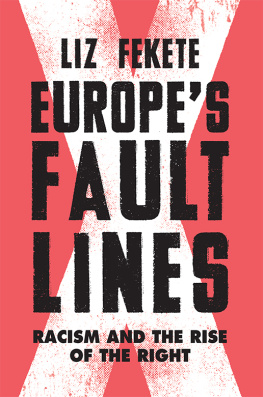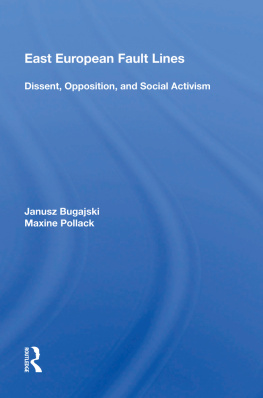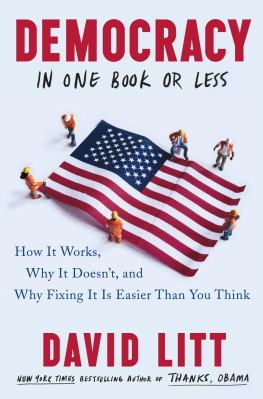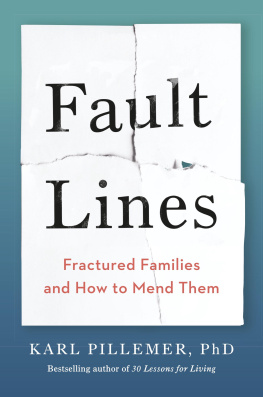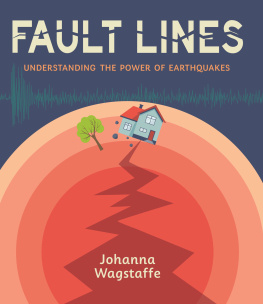Elizabeth ’Liz’ Fekete - Europe’s Fault Lines
Here you can read online Elizabeth ’Liz’ Fekete - Europe’s Fault Lines full text of the book (entire story) in english for free. Download pdf and epub, get meaning, cover and reviews about this ebook. year: 0, publisher: Penguin Random House, genre: Politics. Description of the work, (preface) as well as reviews are available. Best literature library LitArk.com created for fans of good reading and offers a wide selection of genres:
Romance novel
Science fiction
Adventure
Detective
Science
History
Home and family
Prose
Art
Politics
Computer
Non-fiction
Religion
Business
Children
Humor
Choose a favorite category and find really read worthwhile books. Enjoy immersion in the world of imagination, feel the emotions of the characters or learn something new for yourself, make an fascinating discovery.
- Book:Europe’s Fault Lines
- Author:
- Publisher:Penguin Random House
- Genre:
- Year:0
- Rating:5 / 5
- Favourites:Add to favourites
- Your mark:
- 100
- 1
- 2
- 3
- 4
- 5
Europe’s Fault Lines: summary, description and annotation
We offer to read an annotation, description, summary or preface (depends on what the author of the book "Europe’s Fault Lines" wrote himself). If you haven't found the necessary information about the book — write in the comments, we will try to find it.
Europe’s Fault Lines — read online for free the complete book (whole text) full work
Below is the text of the book, divided by pages. System saving the place of the last page read, allows you to conveniently read the book "Europe’s Fault Lines" online for free, without having to search again every time where you left off. Put a bookmark, and you can go to the page where you finished reading at any time.
Font size:
Interval:
Bookmark:

Racism and the Rise of the Right
Liz Fekete

First published by Verso 2018
Liz Fekete 2018
All rights reserved
The moral rights of the author have been asserted
1 3 5 7 9 10 8 6 4 2
Verso
UK: 6 Meard Street, London W1F 0EG
US: 20 Jay Street, Suite 1010, Brooklyn, NY 11201
versobooks.com
Verso is the imprint of New Left Books
ISBN-13: 978-1-78478-722-6
ISBN-13: 978-1-78478-725-7 (US EBK)
ISBN-13: 978-1-78478-724-0 (UK EBK)
British Library Cataloguing in Publication Data
A catalogue record for this book is available from the British Library
Library of Congress Cataloging-in-Publication Data
A catalog record for this book is available from the Library of Congress
Typeset in Sabon by MJ & N Gavan, Truro, Cornwall
Printed in the UK by CPI Mackays, UK
For Kavita,
daughter, teacher, friend
Contents
This book could not have been written without the help of many people, foremost among them A. Sivanandan, my teacher these last thirty-five years, whose political analysis and insights provided the building blocks for everything I have ever written. A massive debt is also owed to both Jenny Bourne and Frances Webber, who read through various drafts and gave of their advice and expertise unstintingly. ).
There are many others to thank, including my colleagues Harmit Athwal, Jon Burnett, Anya Edmond and Hazel Waters, as well as Antonia von der Behrens, Arun Kundnani, Mark McGovern, Peter Pelz and Luc Vervaet. I am particularly grateful to Lisa Schder, who provided brilliant research support on Germany. Finally, I would like to thank Rosie Warren, my commissioning editor at Verso patient, intellectually incisive, and ever supportive.
For some years it has been clear that a coterie of New Right intellectuals in both Europe and North America has been intent on fomenting a reactionary cultural revolution, to shake up and reconfigure politics and take power. Europes Fault Lines sets out to explore the changing dispensation of European politics in turbulent times. On the face of it, the facts after the Brexit referendum, the election of Donald Trump, and the French run-off election that delivered the largest vote to a European far-right presidential candidate since the Second World War have come together in ways that suggest the onward march of the New Right, or even the triumph of fascism. But Europes Fault Lines is not intended to devitalise or scare readers. It may have started out as an interrogation of the burning issues of our time to discover what is specific about racism, populism and fascism today, and what distinguishes it from the classical fascism of the 1930s; but, in the course of writing, another Europe shone through, one where democratic and anti-fascist traditions are profoundly present.
In an illiberal and more authoritarian state, where the seductive veneer of capitalism has been replaced by its more ugly, brutal and predatory face, there will inevitably be counter-movements against racism and nativism, corporate greed and the social reaction of the right. Though in Europes Fault Lines I foreground the changing nature of state racism at a time of a resurgent right, that does not mean there is no countermelody, no resistance, and no civil disobedience. In fact, this book sets out to remind us that humanitarian, anti-fascist and socialist values are far more deeply rooted in European culture than is authoritarianism.
The Centrality of Resistance
The issues addressed in Europes Fault Lines came to the fore precisely because they were the ones already being taken up by the organisations, human rights defenders, anti-racist activists, campaigning journalists and committed artists that I have been privileged to work with, both as director of the Institute of Race Relations (IRR) and as an advisory editor on Race & Class. These people and campaigns challenge, by their very actions, the state and institutional practices that give rise to the various racisms described in the following chapters. Campaigns against Europes complicity in torture, like those in support of the dual-nationality Ali Aarrass, delivered by the Belgians to the Moroccan torture state, amplify the voices of prisoners and ensure that their sufferings are not erased. The campaigners, mainly women, who founded Joint Enterprise Not Guilty by Association (JENGbA) to fight for a change in UK law have deepened our knowledge of neoliberal incarceration regimes and the war against the poor. States deploy various techniques of duplicity and denial when people die in police stations, prisons or immigration removal centres, or are shot at or tasered on our streets. But the knowledge of how to counter institutional denial through campaigns for truth and justice has been handed down from generation to generation, thanks to organisations like Relatives for Justice (Northern Ireland), United Friends and Families, Inquest (United Kingdom), Collectif Angles Morts (France) and the Oury Jalloh International Independent Commission (Germany). The Collective Against Islamophobia in France (CCIF), and the many organisations working in the UK to expose the stigmatisation of Muslims via the governments Preventing Violent Extremism agenda (Prevent), knew the taste and feel of anti-Muslim racism long before Islamophobia was theorised in the academy. Issues of institutional racism in policing and state collusion with the far right would not even be on the agenda if it were not for the activities of organisations like the Monitoring Group in London, the Committee on the Administration of Justice in Belfast, NSU-Watch and Reach Out in Germany, and Popular Action Against State Impunity in Spain. Finally, it has been the magnificent efforts of NGOs, independent search-and-rescue missions and humanitarian volunteers who, in the absence of a social state, have taken over its functions so spotlighting the viciousness of the states preferred option of abandoning refugees and militarising borders. States have responded by attempting to criminalise their decency. Unbelievably, many Danes, including a former childrens ombudsman, have been charged under anti-smuggling laws simply for giving food, clothes, lifts or other forms of help to refugees as they attempted to cross over the bridge from Copenhagen to Malm, Sweden.
Racism, Neoliberalism and the Market State
The seeds of Europes Fault Lines lie in the previous collection A Suitable Enemy: Racism, Migration and Islamophobia (2009), which was based on my work over sixteen years at IRR researching issues of racism and refugee policy in Europe. It was in 1992, just after the anti-migrant pogroms at Hoyerswerda and then Rostock in Germany, that the IRR first began to look at the harmonisation of refugee and immigration policies across Europe, charting the path from the extreme rights call for an exclusive national preference and cultural identity in the 1990s, to the institutionalisation of anti-foreigner racism (xeno-racism) and anti-Muslim principles within European immigration asylum and national security laws in the 2000s. This new book picks up the story from 2009. It examines the accumulated pressures now exposing fundamental fault lines of racism and authoritarianism in Europe. Old racisms may be structured deeply in European thought, but they have been revitalised and spun in new ways under a variety of forces, including that of the War on Terror, the cultural revolution from the right and the migration-linked demonisation of the destitute scrounger (the latter breathing new life, in the process, into social-Darwinist ideas about the deviant, asocial and workshy). In the process, xeno-racism, a non-colour-coded and highly malleable form of racism a way of denigrating and reifying asylum seekers before segregating and/or expelling them, first identified by A. Sivanandan in his 2001
Font size:
Interval:
Bookmark:
Similar books «Europe’s Fault Lines»
Look at similar books to Europe’s Fault Lines. We have selected literature similar in name and meaning in the hope of providing readers with more options to find new, interesting, not yet read works.
Discussion, reviews of the book Europe’s Fault Lines and just readers' own opinions. Leave your comments, write what you think about the work, its meaning or the main characters. Specify what exactly you liked and what you didn't like, and why you think so.

